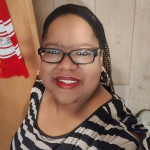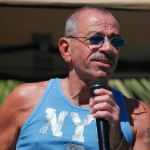Mountville, Pennsylvania
Positive since 2002
I have a personal story to share. One about medicine, doctors, disease and feeling crazy.
Last year, I had many more medical issues than my norm. I have been on many different medications over the 15 years I have been living with HIV, and I pride myself on being an advocate for my health. Ninety-nine percent of the time, I do what my doctors tell me to do. I challenge them when I feel the need to, and I ask lots of questions. I always take a list of questions to my doctor appointments. I’m famous for taking notes. I’ve even had medical professionals ask me if I work in the medical field because I seem so knowledgeable. I gained that knowledge from years of having a chronic illness.
In the beginning of October, a specialist I was referred to prescribed a medicine to me after seeing me for approximately three minutes. Even though I had questions, I felt rushed out of the office. I was flabbergasted that the visit happened so fast. I thought to myself, Well, I’m sure he’s already read my medical history. His reputation made me have faith that he knew what he was talking about. So I proceeded to take the prescription that he suggested.
After taking the medicine for two weeks, I started feeling crazy. I knew I was not feeling like my normal self—it was almost like I didn’t have control of how I felt. I stayed at home in bed during most of October. It really freaked me out. I felt like I couldn’t get out of bed. One morning, it got to the point where I called the doctor at 3 a.m. and started freaking out at him and told him how I felt at that exact moment because I wanted him to know what was happening to me. I vowed never to see him again.
I worked up the courage to see another doctor who decided I did not need the medication and weaned me off it. Stopping immediately could have caused seizures. October was the worst month of my life as far as medicine goes.
I believe we are all responsible for researching medications before we take them. Normally, I do that. I’m the patient who always asks questions. Even if I’m in the hospital and the nurse is about to give me a medication that she’s already given me 10 times, I still ask what she’s giving me. I like to be informed and educated.
Unfortunately, in this instance, it was my fault for having faith in the doctor and taking his word after a three-minute visit. I didn’t research the medication until after I took it.
You should take your own approach to investigating what you’re taking. Just because the doctor tells you something is right for you, it might not always be. Get a second opinion if necessary.
It’s taken me a very long time to find doctors I have a real relationship with. After some first doctor visits, I haven’t gone back. I can’t deal with doctors who have no bedside manner and have an attitude right from the start. I hate when people jump to conclusions and generalize. Doctors should not do this.
I belong to a support group. People think that if you look fine, you must feel fine. I can’t tell you how many days I’ve stayed at home because I don’t have the energy or the stamina to go out. People with HIV can live healthy lives, but you have to remember there are different degrees and levels of this disease.
In some ways, it’s kind of embarrassing to expose myself in such detail, but I feel like it’s my responsibility to share the reality of what goes on with some people who have HIV. I am currently undetectable. If you don’t know what that means, click here because I want you to get all the details. Basically, being HIV positive and undetectable means that you have undetectable levels of virus in your body. It doesn’t mean that you might not have other issues, but your likelihood of transmitting HIV to another person through sex is almost nil.
For many years, I’ve kept my HIV status very private. But it’s something that I’ve learned is a part of me. It’s a large part of me, but it’s not the biggest part of me. I want people to look at me and think, That’s Bob. He’s got HIV. But who cares?
I never thought that I would be in this situation. And I know a lot of other people who thought the same thing. I was very naive, young and uneducated. People need to be more educated.
HIV awareness is still so important. A lot of parents don’t want their children to be taught about sex—or diseases related to sex—in school. I’m not an expert on when to talk to a child about these things, but I believe they should be educated about HIV and other issues when they are in high school. Ideally, the students would be able to ask questions of someone who is living with HIV. Real questions with real answers can and should be asked.
A lot of young people are having sex—whether we like it or not. If you’re Christian, some of your children are having sex. If you’re an atheist, some of your children are having sex. If you’re Muslim, some of your children are having sex.
A few people under 18 have confessed to me that they have had sex while in high school. I’ve done my best to inform them of the risks involved. They’re at an age where they’re not always emotionally mature, but society can pressure them to have sex. I always try to make them aware of the risk of pregnancy and sexually transmitted diseases, such as HIV, syphilis and gonorrhea. I’m definitely not an expert, but I’m enough of an expert on my own condition. I know I need to learn more.
Educate yourself and others—especially youth—and be your own advocate. You need to know about the medications you’re taking, who your doctors are and what kind of experience they have. For example, before I saw my oncologist, I researched his education and his experience. I did the same thing for the oncology orthopedic doctor who removed my tumor.
I hope this advice helps someone. It’s something I’ve been wanting to get off my chest. And I appreciate you reading it. Have a great day!
What three adjectives best describe you?
Funny, HIV-educated and honest.
What is your greatest achievement?
I was actually featured in a POZ magazine article in August 2006. That was a big deal for me. So much has changed over the past 12 years.
What is your greatest regret?
Being naive about HIV when I was younger.
What keeps you up at night?
I worry about my future and getting older. I have no children. Some of my family and I are distant. What will happen to me when I’m elderly and can’t take care of myself?
If you could change one thing about living with HIV, what would it be?
I wish there was less or, ultimately, no stigma. Many guys over the years have refused to date me even though I’m undetectable. There’s such a lack of real information.
What is the best advice you ever received?
Be yourself no matter what anyone tells you. My grandmother also always said, “Never say never.” At one point, I said I’d never get HIV. But look at me now.
What person in the HIV/AIDS community do you most admire?
My best friend. I love his attitude toward HIV. He’s always honest and direct. Even though I’m always the sicker one, he’s always genuinely there for me.
What drives you to do what you do?
When I see a need, I must be vocal. I’m a bit quiet when I’m sick. But when I see an opportunity to educate, I do. I love to help people. My dream would be to speak to large groups.
If you had to evacuate your house immediately, what is the one thing you would grab on the way out?
I can’t help but say two things, mostly because they usually sit side by side. My mother’s 8-by-10 framed high school graduation picture. She was my greatest fan and supporter (R.I.P. 2012) and my journal.
If you could be any animal, what would you be? And why?
The first thing that comes to my mind is a lion because I’m a Leo. But in all honesty, I would say a dog to a faithful, kind and loving owner because I want to love and be loved unconditionally.







Comments
Comments